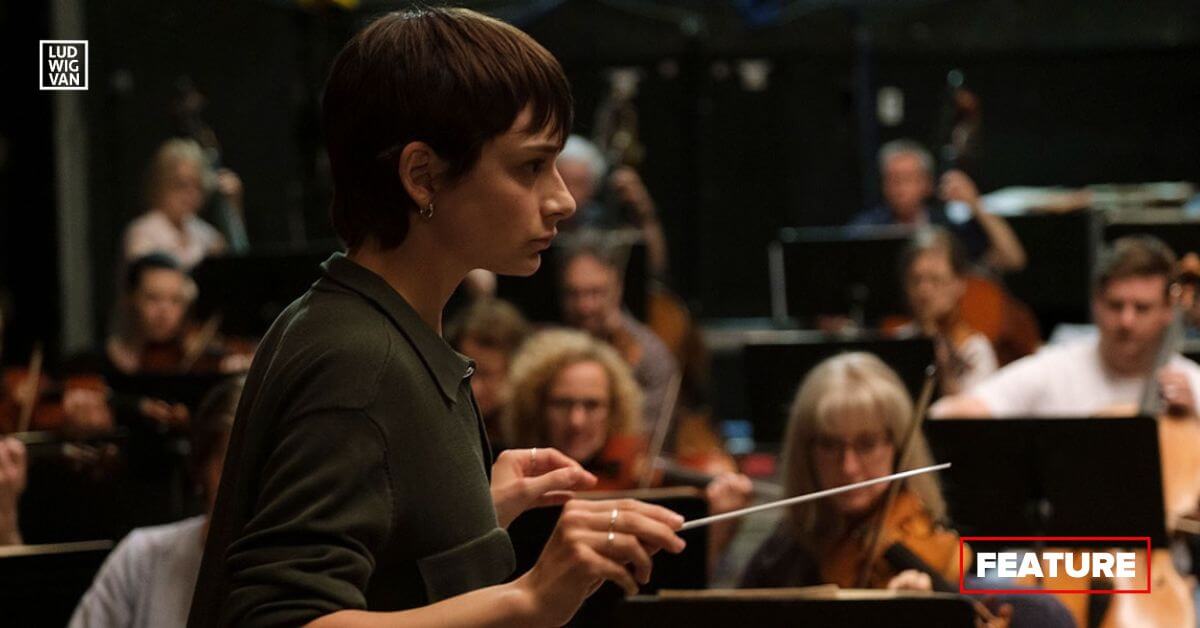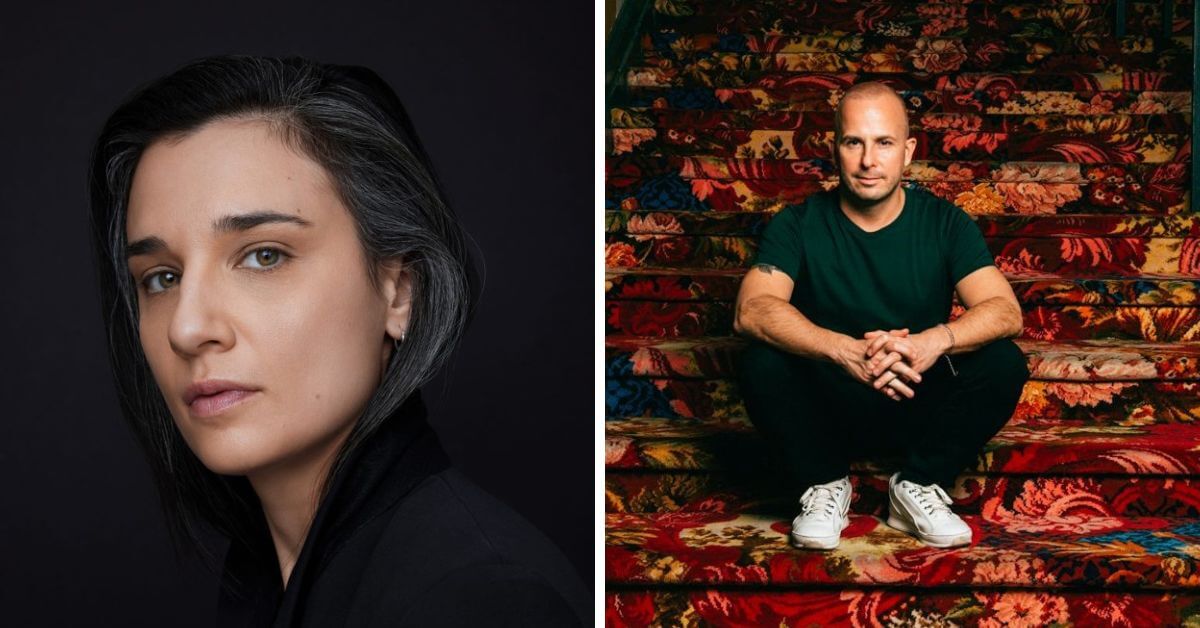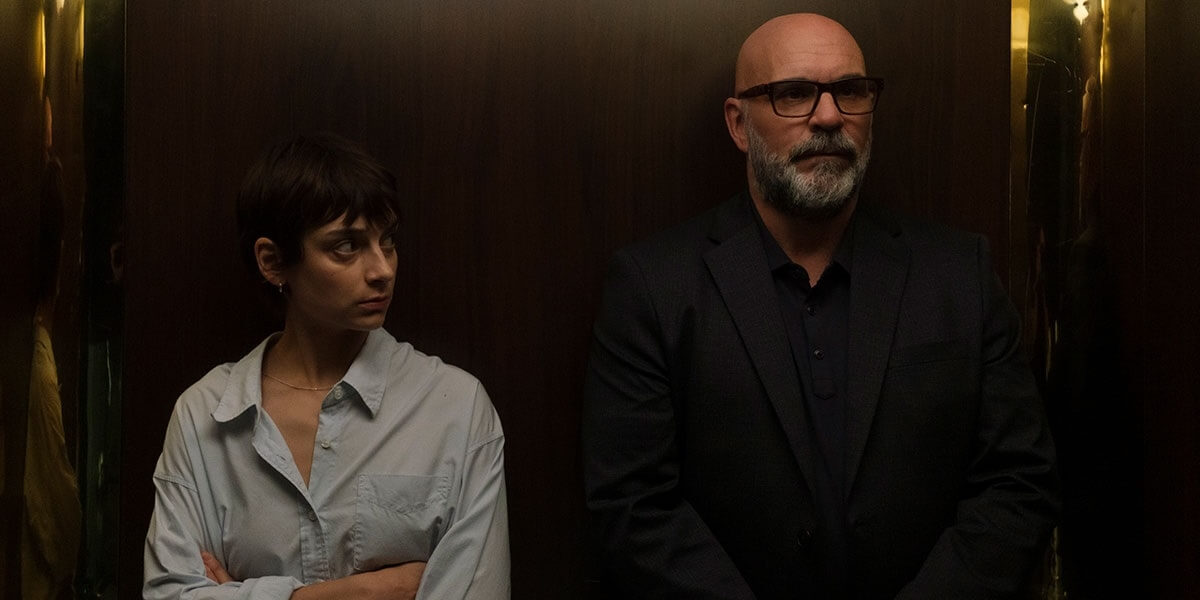
[ad_1]

Days of Happiness/Les Jours heureux, set in Montréal’s classical music scene, noticed its world premiere on the 2023 Toronto Worldwide Movie Pageant. Written and directed by Chloé Robichaud (Sarah Prefers to Run/Sarah préfère la course, Boundaries), conductor Yannick Nézet-Séguin labored with Robichaud to make sure that the small print of the classical music world and its roles had been portrayed with realism.
The Canadian movie stars Sophie Desmarais as a younger conductor grappling with household pressures together with these of her occupation, with co-stars Sylvain Marcel, Nour Belkhiria, and Maude Guérin, and cinematography by Ariel Méthot.
The Story
The film opens with a household scene at a lakeside cottage, one stuffed with the type of odd tensions frequent to these gatherings. Emma is alone on a float on the lake, awkwardly put ready to ask for assist. It units the tone for an emotional character research of Emma, an rising conductor who’s coping with a stress cooker of influences from all sides.
There’s her father/supervisor, and his overbearing and considerably infantilizing approach of coping with her and her profession. Then, there’s her girlfriend, who doesn’t appear to need/want a relationship fairly as a lot as Emma wants the full-time emotional assist.
As if these pressures weren’t sufficient, her conducting residency is working out with nary a contract signing in sight. Can she play her playing cards strategically sufficient to get an actual probability on the subsequent step in her profession? Will Dad let her breathe as an expert together with her personal sensibilities?
On prime of all that, can she discover her personal voice and imaginative and prescient as a conductor in a profoundly hierarchical world the place listening to, and following, her mentor’s recommendation is non-negotiable? Penetrating the fog to seek out her personal imaginative and prescient as an artist turns into Emma’s breakthrough, and her approach ahead.
We spoke with Chloé and Yannick in regards to the film and extra.

The Interviews
Director Chloé Robichaud got here to the world of classical music as an outsider, however a fascinated one. “I used to be attracted at first simply in regards to the concept of getting a younger feminine conductor on the display screen.” It’s a theme and a type of character she’s been drawn to in her different movies.
“I wish to have girls on display screen in positions that we’re not used to seeing. However, then I began doing the analysis, and I fell in love with the classical world, and I used to be like, how wonderful is that this classical music to inform a narrative?” she says. “It’s very common — everybody can join. It may inform a narrative with out utilizing phrases.”
Yannick Nézet-Séguin, music director of the Orchestre Métropolitain, the Metropolitan Opera, and the Philadelphia Orchestra, just lately additionally served as advisor to Bradley Cooper in taking over the function of Leonard Bernstein within the biopic Maestro. However, his involvement with Les jours heureux goes again a few years or extra.
“Chloé Robichaud contacted me as a part of her analysis. She wished to ask me questions. She stated, I’m writing a state of affairs. I’m about conducting; I must ask you a couple of questions. I keep in mind the cellphone dialog, and naturally, I knew her work,” he says.
“I believed it was intriguing, however didn’t fairly know the place this was going. When she formally requested me, can I am going and observe rehearsals, and defined to me the state of affairs, I used to be actually all in, as a result of I believed this was a movie that may showcase the artwork type that I like — symphonic music, classical music — however in a really emotional and true approach, the place music performs a job of emotional liberation. That I feel is uncommon.”
He notes that Hollywood appears to be taking extra curiosity within the classical music world normally of late, together with movies like Tár, and Chevalier, and the emphasis now could be on realism. Traditionally, the film world’s favorite use of conductors and classical music normally is as as type of stereotype or unique milieu.
Final 12 months’s Tár, particularly, is an apparent comparability.
“Tár got here very a lot as a shock for us, as a result of Chloé has been writing her state of affairs for years. It at all times concerned a girl, and it at all times concerned a relationship with a cellist. In order that was type of eerie, to be the identical,” he says, “however the films are so completely different.”
As Emma, Sophie conveys a lot with out talking within the film. It’s her physique language that tells us her mind-set. “Once I began writing the synopsis, I believed, I want Sophie for that,” Chloé says. She notes her intelligence as an actress.
“Sophie spent a superb two years making ready for this function,” Yannick says. He notes that the very first thing she requested him was what music idea books she needs to be learning. He was shocked — he assumed she’d merely be faking it. “On the finish of the day it turns into extra choreography than conducting, however she didn’t wish to take any shortcuts. She actually listened to the music, and watched loads of movies.”
He had two collaborators for her coaching. “Generally Sophie would need three classes every week!” he laughs.
Chloé says that the final six months had been notably intense.
“She has a really sturdy, what I name internal life, so she doesn’t must have phrases. You simply put a digicam on Sophie,” she explains. “I wanted that. It’s all about physique language, and the way the physique speaks for her.”
Her manner adjustments over the course of the movie, and with each bit of music she works on.
“Sophie was actually good at that, at discovering the nuances within the motion,” Chloé says. Sophie was naturally a bit nervous at first to face in entrance of the seasoned musicians of l’Orchestre Métropolitain, even within the managed surroundings of rehearsals for the movie. “I instructed her, use that, use your individual nervousness.”
They shot the scenes of Mozart first, in order that Sophie’s actual tensions come by way of in character. As she progressively loosens up as an actress, the manufacturing used her actual world evolution to reflect that of Emma’s within the movie. “It was my precedence to get that proper.”

The prep reveals. In the course of the movie, Emma goes by way of a metamorphosis from a gifted, however too uptight newbie, to somebody who’s starting to return into her personal.
“These nuances took loads of time,” Yannick says. “It’s onerous sufficient in case you are an expert to do this.”
Yannick factors out that it’s not solely Emma’s actions as a conductor which are practical, however the basic manner of the orchestra and musicians, the dynamic between conductor and orchestra. It’s a world of civility, the place individuals are centered on working collectively. Nonetheless, there are tensions that come to the floor. In a single scene, after Emma and the orchestra carry out Schoenberg, a deep-pocketed sponsor gives a passive-aggressive critique of her selection — not a crowd favorite. That, too, is practical.
“I feel it’s exhibiting additionally how this subject is evolving in the meanwhile,” he provides. “It’s exhibiting that it’s not less than attainable to be a younger girl, a lesbian, on the rostrum, and individuals are accepting of that.” Within the story, Emma’s relationship together with her girlfriend is handled as matter of reality. “Not so way back, that may have been groundbreaking.”
It was Chloé’s dedication to presenting the world of classical music in its true type that drew him in. “It was that dedication to realism was type of a situation for me to say sure to this movie,” he says.
Yannick conducts the Orchestre Métropolitain within the movie through the live performance scenes. Nonetheless, he says the musicians did play for Sophie through the rehearsal scenes. “They’re taking part in for actual — they’re not air taking part in,” he says.
For Chloé, the music is intertwined with the story. “Simply the music is a personality within the movie in itself, and it’s telling the journey of Emma,” she explains.
The film’s sections are named after the composer Emma and the orchestra are tackling within the ensuing scenes: Mozart, Schoenberg, and Mahler. “It felt like chapters of her journey. It’s to mark additionally, similar to a symphony, the actions,” says Chloé.
Chloé modified her method visually for every to mirror Emma’s evolution by way of the method. For Mozart, the scenes are properly lit. “The best way I body it, the best way I edit it, is extra, I’d say, classical. Technical,” she says.
“Once we arrive on the Schoenberg, we go to rather more darker areas of my path. Even the lighting, and the best way I body, is extra expressionist. There may be even, properly Schoenberg is about dissonance, and the lenses I take advantage of are dissonant. I am going from lengthy lens to white lens; it’s not one thing that you simply often do. After which the Mahler, it was simply connecting to the Mahler and the emotion of the music. The digicam is flowing with the character at that time.”
The stress cooker surroundings that Emma faces within the film is all too practical for a younger artist. “It utterly is,” Yannick confirms. Emma finds her energy and her voice by way of the music.
The emphasis on the therapeutic energy of music is one other facet that drew Yannick to the mission. “That’s why I’m very completely happy about it.” How Emma interprets the music can also be a part of her personal emotional state and growth.
He factors out that adjustments within the classical music world, mirrored within the movie, additionally echo these of the bigger world. “[It’s] how our society is reassessing now what it’s to be a pacesetter, and the way vulnerability has to take a job,” he explains. “I attempt to educate younger conductors that it’s a lifelong factor, you already know, you’re by no means fairly there. However, I attempt to educate that it’s worthwhile to settle for your vulnerability, and that every little thing you’re feeling inside is mirrored within the music making.”
Classical music could also be having its second within the films proper now. “I don’t know why that is occurring,” Yannick says, “however I do know that for our artwork type, it’s a fantastic alternative to only defuse to everybody what we imagine in.”
Let’s hope it lasts.
The movie can be introduced in an occasion screening at Théâtre Maisonneuve within the Place des Arts on October 16, with Yannick Nézet-Séguin and l’Orchestre Métropolitain in attendance. Les jours heureux will then go into basic theatrical launch on October 20 in Québec, and a bit later in the remainder of Canada.
#LUDWIGVAN
Get the every day arts information straight to your inbox.
Join the Ludwig van Every day — classical music and opera in 5 minutes or much less HERE.
[ad_2]